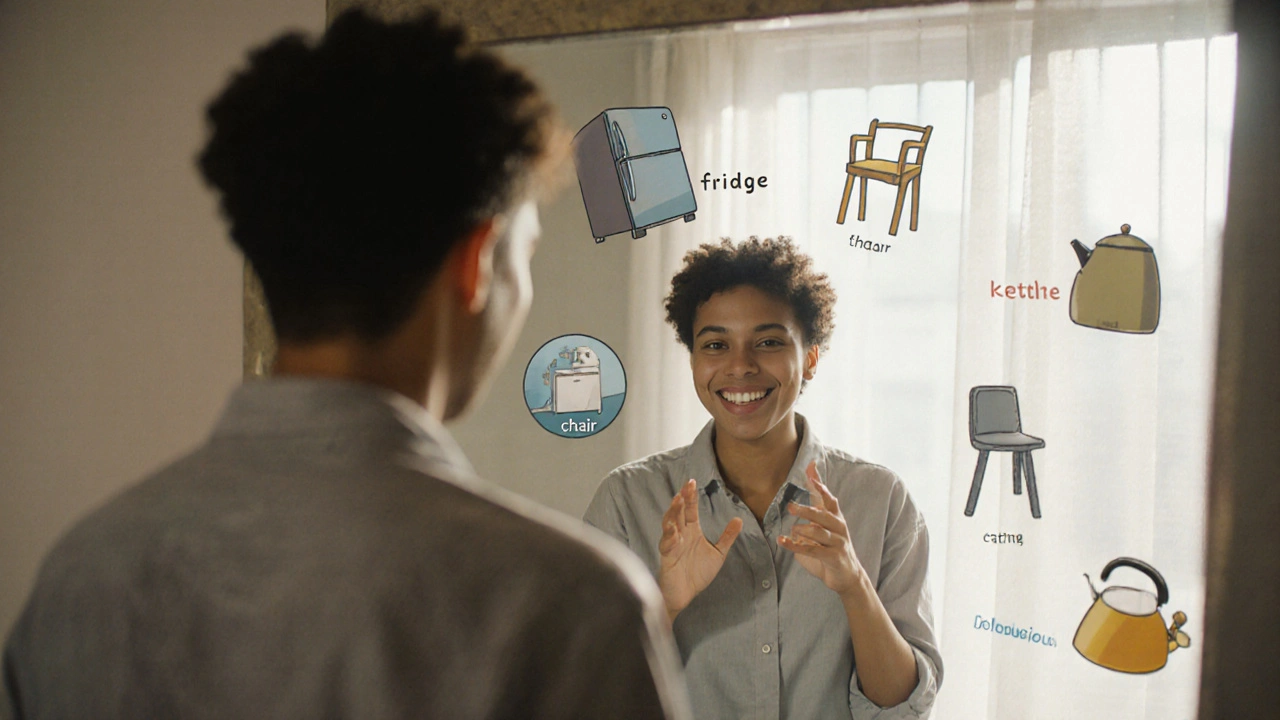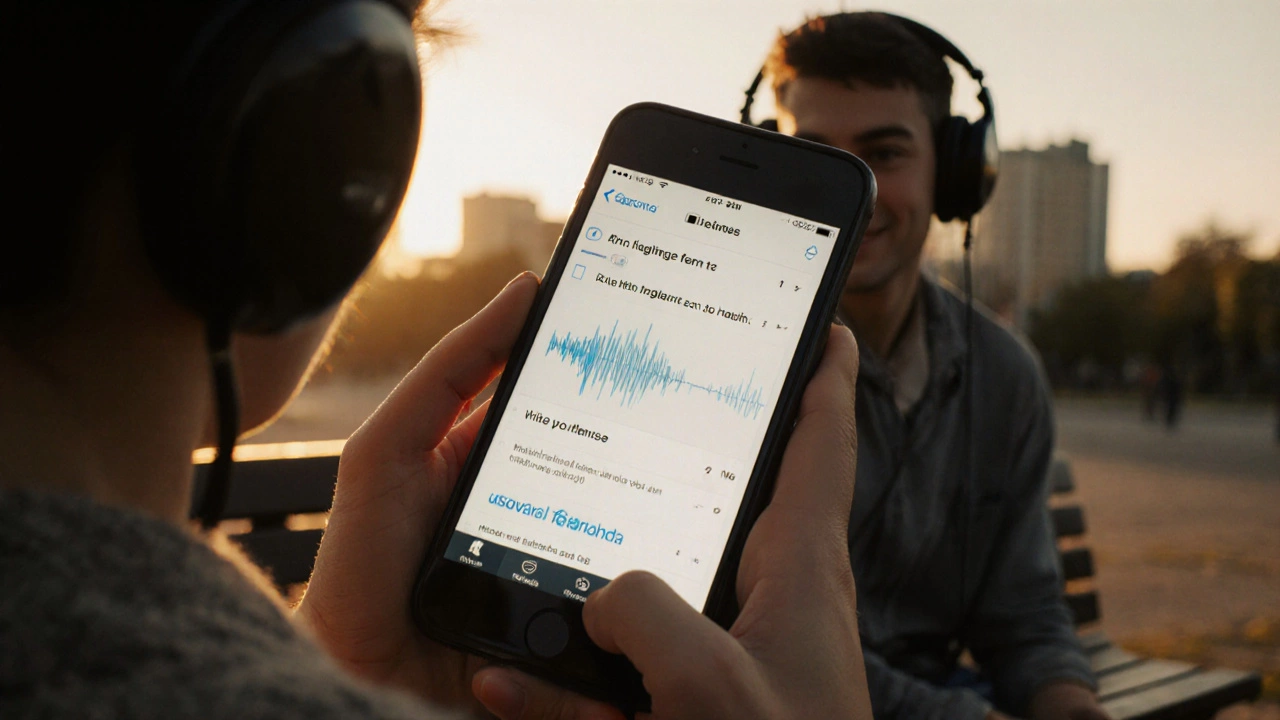
Want to speak English without stopping every few words to search for the right word? You’re not alone. Millions of people around the world feel stuck between understanding English and actually speaking it. The problem isn’t grammar or vocabulary-it’s fear. Fear of sounding silly, fear of being misunderstood, fear of making mistakes. But here’s the truth: fluency isn’t about perfection. It’s about progress.
Stop waiting for perfect English
Most people think they need to master grammar rules, memorize 500 new words, and take ten courses before they can speak. That’s a trap. You don’t need to be perfect to be understood. You just need to be consistent.Think about how you learned your first language. You didn’t study verb conjugations at age three. You heard people talk, you copied sounds, you made mistakes-and no one corrected you every time. You just kept going. The same works for English.
Start speaking now, even if your sentences are broken. Say, "I go store yesterday" instead of "I went to the store yesterday." People will still understand you. And every time you speak, your brain gets better at connecting thoughts to words.
Practice daily-even for five minutes
Fluency doesn’t come from weekly lessons. It comes from daily repetition. You don’t need hours. Five minutes a day, done every single day, beats three hours once a week.Here’s how to do it:
- Record yourself talking for 3 minutes about your day. Play it back. Don’t cringe-listen for patterns, not mistakes.
- Shadow a short clip from a YouTube video or podcast. Play it, pause, repeat what the speaker says out loud. Match their rhythm, not just their words.
- Talk to yourself in the mirror. Describe what you’re doing: "I’m making coffee. The water is hot. I like it with milk."
These aren’t fancy exercises. They’re simple. But they build muscle memory. Your mouth and brain start working together faster.
Listen like a language learner, not a listener
Listening isn’t passive. If you’re just letting English play in the background while you cook or commute, you’re not improving. You’re just hearing noise.Active listening means focusing on how people say things, not just what they say. When you watch a TV show or listen to a podcast:
- Pause after every sentence. What did they say? Can you repeat it?
- Notice how they connect words. "I want to" becomes "I wanna." "Going to" becomes "gonna." These aren’t slang-they’re how real people talk.
- Write down one new phrase you hear. Use it in your next conversation.
People who speak fluently didn’t learn from textbooks. They learned from real conversations. Your goal is to hear English the way native speakers use it-not the way it’s written in a grammar book.

Find your speaking partner
Talking to a teacher or tutor helps-but it’s not enough. Real fluency grows when you speak with people who don’t care if you make mistakes.Look for:
- Local language exchange meetups (Melbourne has several, like "English Conversation Circle" at the State Library)
- Online apps like Tandem or HelloTalk where you chat with native speakers
- Facebook groups for English learners in Australia
Don’t wait for someone to be "perfect." Find someone who’s also learning. You’ll both get better. And if you’re nervous, start with text chats. Then move to voice messages. Then video calls. Slowly, you’ll build comfort.
Stop translating in your head
This is the biggest blocker to fluency. You hear a question: "What did you do this weekend?" You think: "Weekend-akhir hafte-what did I do? Went to park-yes, went to park. Past tense-goed? No, went. Okay, say it." By the time you speak, the moment’s gone.Fluent speakers don’t translate. They think in English. How do you train that?
- Label things around your house in English: fridge, door, chair, kettle.
- Think your inner monologue in English. Instead of "I’m hungry," think "I need to eat."
- Describe your surroundings in English as you walk to work: "The sky is gray. The bus is late. A dog is barking."
It feels weird at first. But after a week, your brain starts skipping the translation step. That’s when fluency clicks.
Embrace mistakes-they’re your fastest teacher
Every mistake you make is data. It tells your brain what not to do next time.When you say "I have 25 year" instead of "I am 25," don’t beat yourself up. Say it again correctly right after: "I am 25." Then move on. That’s how you fix it.
Native speakers make mistakes too. They say "I seen it" instead of "I saw it." They mix up "there," "their," and "they’re." But they don’t stop talking. They keep going-and so should you.
The more you speak, the fewer mistakes you’ll make. Not because you memorized rules-but because your brain learned from experience.

Build confidence by tracking small wins
Confidence isn’t something you wait for. It’s something you build.Keep a simple log:
- Monday: Spoke to a cashier in English. Didn’t panic.
- Wednesday: Asked a question in a Zoom call. Got an answer.
- Friday: Watched a movie without subtitles. Understood 70%.
These aren’t huge achievements. But they’re proof you’re moving forward. Look back at this list every Sunday. You’ll see progress you didn’t notice day to day.
What’s holding you back?
If you’re still stuck, ask yourself:- Am I waiting for the "right time" to start speaking?
- Do I avoid conversations because I’m afraid of sounding stupid?
- Am I learning grammar rules instead of practicing real speech?
If you answered yes to any of these, you’re not behind. You’re just stuck in the wrong cycle. Break it by speaking-today, even for five minutes.
Fluency is a habit, not a goal
You won’t wake up one day and suddenly sound like a native speaker. But if you speak every day-even badly-you’ll get there. Not because you’re talented. Because you showed up.Fluency isn’t about sounding perfect. It’s about being understood. It’s about saying what you mean without stopping. It’s about feeling okay when you mess up-and trying again.
Start today. Speak out loud. Even if it’s just to your cat. Your future self will thank you.
How long does it take to speak English fluently?
There’s no fixed timeline-it depends on how often you practice. Someone who speaks 30 minutes a day, five days a week, usually sees clear improvement in 3 to 6 months. Fluency isn’t about speed; it’s about consistency. You don’t need years. You need daily effort.
Should I take an English course to become fluent?
Courses can help with structure, but they won’t make you fluent on their own. Real fluency comes from speaking, not listening to lectures. Use courses to learn useful phrases and grammar basics, then practice those phrases in real conversations. A course without practice is like learning to swim by watching videos.
Why do I understand English but can’t speak it?
This is called "receptive fluency." You’ve trained your ears, but not your mouth. Listening and reading are passive skills. Speaking is active. It requires your brain to pull words out quickly, form sentences, and say them aloud. That takes practice. Start speaking-even if you’re slow. Your speaking muscles need training too.
What’s the best way to improve pronunciation?
Focus on rhythm and stress, not perfect sounds. English isn’t about saying each word clearly-it’s about how you connect them. Try shadowing: listen to a short clip, then repeat it exactly as the speaker does, matching their speed and intonation. Record yourself and compare. Do this for 5 minutes a day. You’ll notice changes in a few weeks.
Is it okay to use simple words instead of fancy ones?
Yes, absolutely. Fluent speakers use simple words most of the time. Saying "I got a new job" is clearer and more natural than "I obtained new employment." Don’t try to sound smart. Try to be understood. Real conversations use everyday language, not textbook vocabulary.
How do I stop being nervous when speaking English?
Nervousness fades with exposure. Start small: speak to yourself, then to a friend, then to a stranger online. Each time you speak, your fear gets a little smaller. Also, remember: most people don’t notice your mistakes. They’re focused on what you’re saying, not how you’re saying it. Your confidence grows when you stop waiting to feel ready-and just start.
